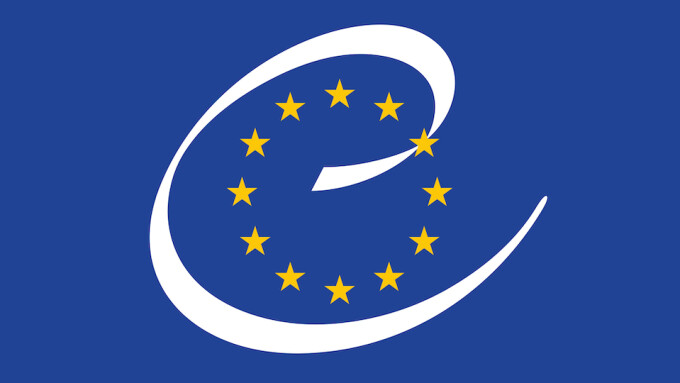STRASBOURG, France — The Council of Europe, the continent’s main post-WWII human rights organization, published a resolution late last month that recommends sweeping government intervention in the regulation of adult content online.
The Council of Europe resolution is now being hailed by religious anti-porn groups as a blueprint to censor sexual content in all of the 47 member countries of the organization, which includes 27 EU countries.
The text of the resolution was adopted in November by the Standing Committee, acting on behalf of the Parliamentary Assembly and based on a 2019 report from the Committee on Equality and Non-Discrimination, headed by Frank Heinrich.
The Council of Europe’s resolution includes a number of controversial and/or suspiciously-sourced statements that seem to echo anti-porn propaganda by both religious activists and sex-worker-exclusionary feminists.
Exaggerated Statistics About 'Half of All Internet Traffic"
“Pornography is ubiquitous and easily accessible, particularly online,” the preamble begins, immediately adding, without citing any source, the dubious statistic that “it is estimated that over half of all internet traffic is related to pornography and sex.”
The resolution then mentions, in passing, “research” supposedly showing that “pornography contributes to shaping people’s mindsets on sexuality and perceptions of gender roles, often engendering and perpetuating stereotypes thereby undermining gender equality and women’s self-determination by conveying an image of women as subordinate to men, as objects and trivializing violence against women.”
The Council of Europe’s Parliamentary Assembly claims that implementing its proposals would “address the negative and degrading image that pornography portrays of women.”
This November 2021 resolution quotes a previous 2011 resolution concerning loosely-defined “violent and extreme pornography,” alleging that “this type of pornography further erodes the conditions for achieving effective gender equality, alongside other forms of hard and soft pornography, the widespread use of sexualized images of women for commercial purposes and the portrayal of gender stereotypes by the media and the entertainment industry.”
An Open Call for Morality-Based Censorship
While briefly acknowledging that “freedom of expression is a pillar of democratic societies and a right guaranteed by the European Convention on Human Rights,” the resolution nevertheless seems to contradict that statement by including, among a list of potential exceptions that justify limiting freedom of expression, “the protection of morals.”
European countries, unlike the U.S., do not have a basic jurisprudence touchstone for freedom of speech like the First Amendment, leaving the limits of free expression to be delineated according to a variety of situational factors.
The resolution also calls for European students to be instructed through “sexuality education programs” that “should define, identify and explain the nature of pornography and specify its health, ethical, legal and gender equality implications” and “highlight that pornography cannot replace reliable sources of information on sexuality and that it may convey inaccurate messages on gender roles, perpetuate gender stereotypes and foster sexual violence and other forms of gender-based violence.”
Demanding 'Warning Labels Similar to Smoking' for Porn
Despite the vast scientific literature debunking the myth of substance-abuse-like “porn addiction,” the resolution demands urges governments to “introduce warning label systems requiring pornographic websites to display a notice warning about the potential harms of pornography use, similar to alcohol, smoking or online gambling warning labels.”
The resolution is asking governments to mandate that “pornography providers […] collect and store the identity and contact details of persons uploading pornographic material for public diffusion, with a view to facilitating criminal prosecution in cases where participants have not consented to diffusion or the material originates from trafficking in human beings, child abuse or other criminal activity.”
Going even further, the Council of Europe is asking member nations to enact sweeping legal reforms which would criminalize “violent pornography.”
The committee also wants to ban pornography in the workplace and require employers use internet filters to accomplish this, require public libraries and schools to do the same, require computers and other electronics to filter pornography by default, require internet providers to ask customers to choose whether or not pornography should be accessible through their service, and introduce age verification to access pornography or require adult companies to do so.
A Ban on All Porn Advertising
Furthermore, the recommendations include “banning public advertising of pornography” and mandating that governments “investigate the possible link” between pornography and human trafficking for the purpose of sexual exploitation.
In a striking paragraph that is already being invoked by anti-porn crusaders looking for state funds to be re-routed to their coffers, the Council of Europe asks that governments “promote research and data collection on pornography, based on a transdisciplinary and cross-cultural approach, and allocate adequate funding for it, with a view to providing accurate information to teaching staff, social workers, healthcare providers and legislators, including on the types and frequency of usage of pornography and on the prevalence and impact of sexist portrayals of women and girls in pornographic material, the extent to which they exacerbate gender inequalities and violence against women and girls, and also on their impact on women’s physical, sexual and psychological health.”
Aping the language of anti-sex-work activists and those endorsing the myth of “porn addiction,” the resolution ends with a call for states to “provide adequately funded exit services to people who wish to leave the sex industry, including pornography” and “promote and provide counseling and support services for compulsive users of pornography.”
Read the full text of the Council of Europe resolution here.






